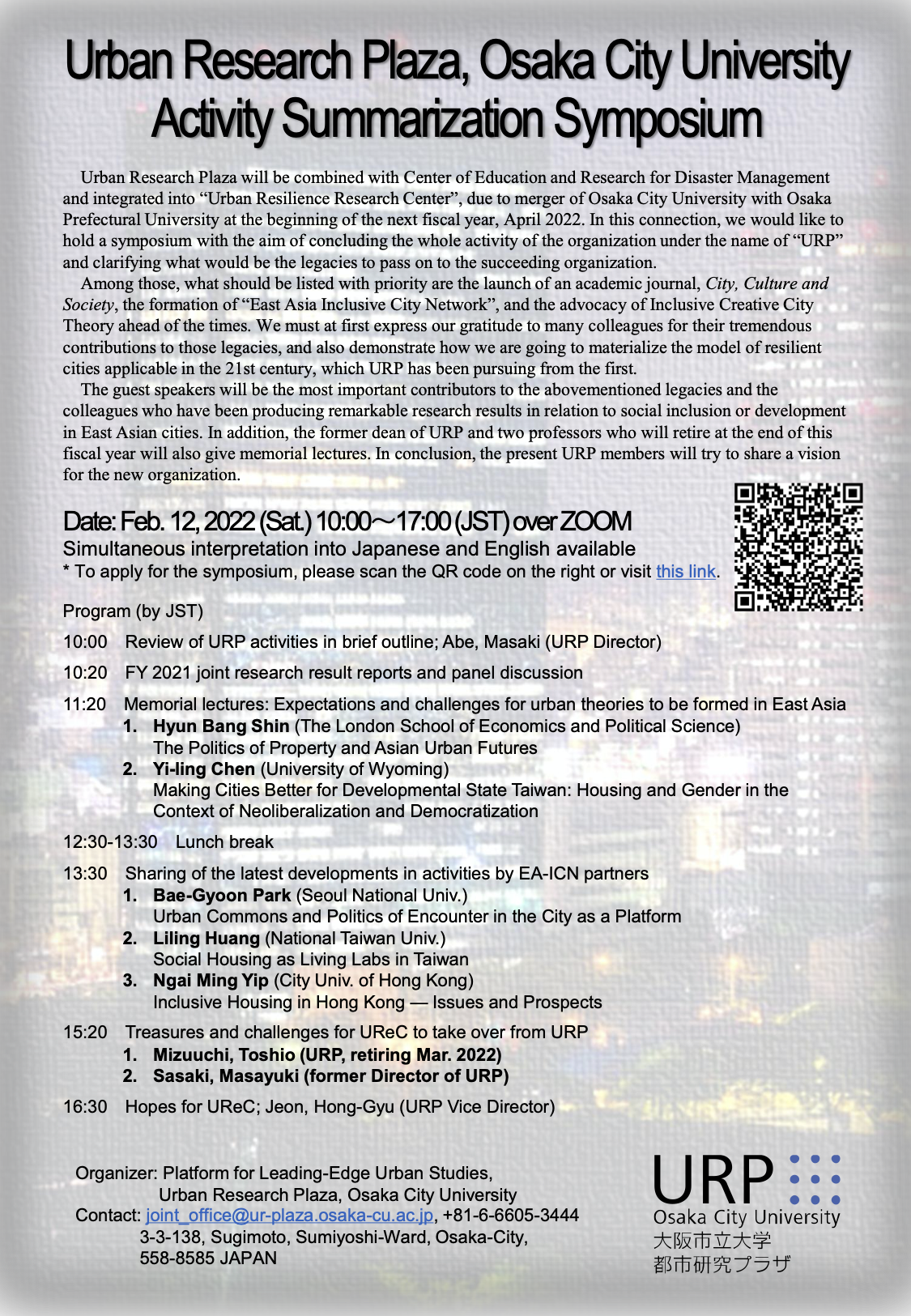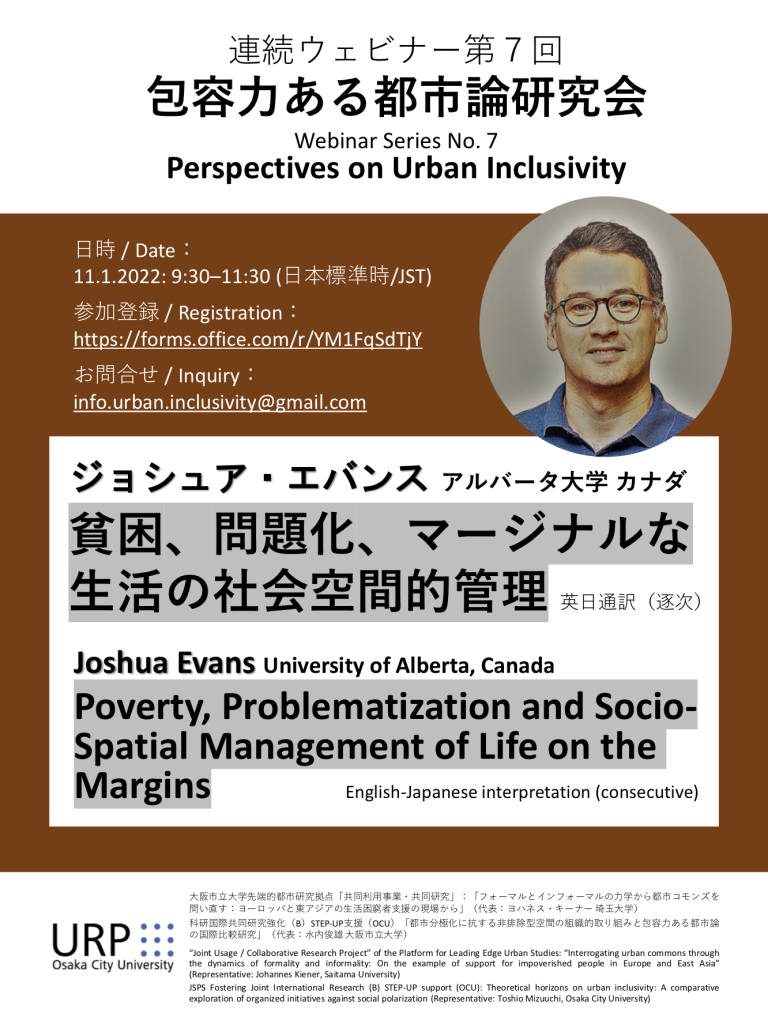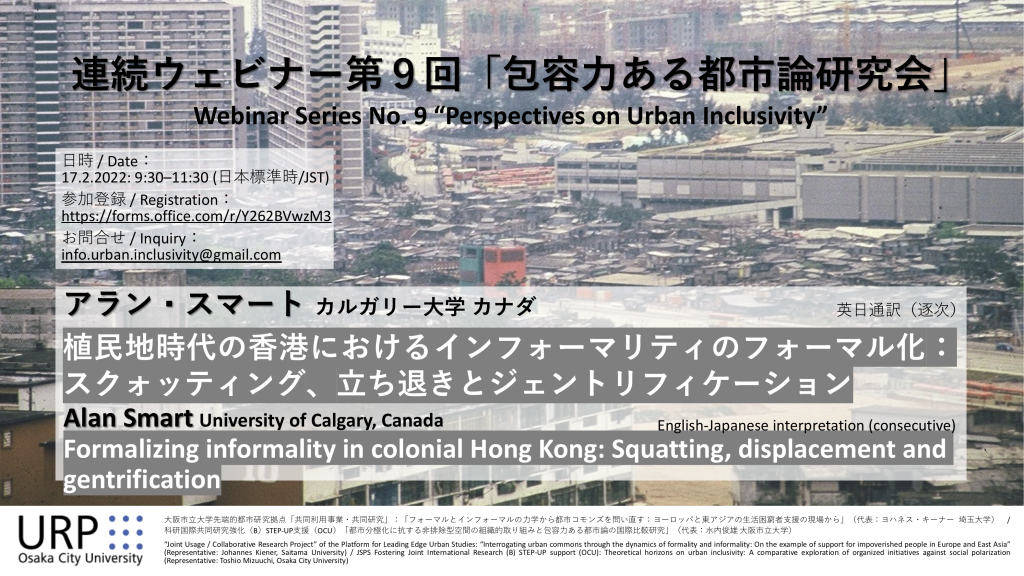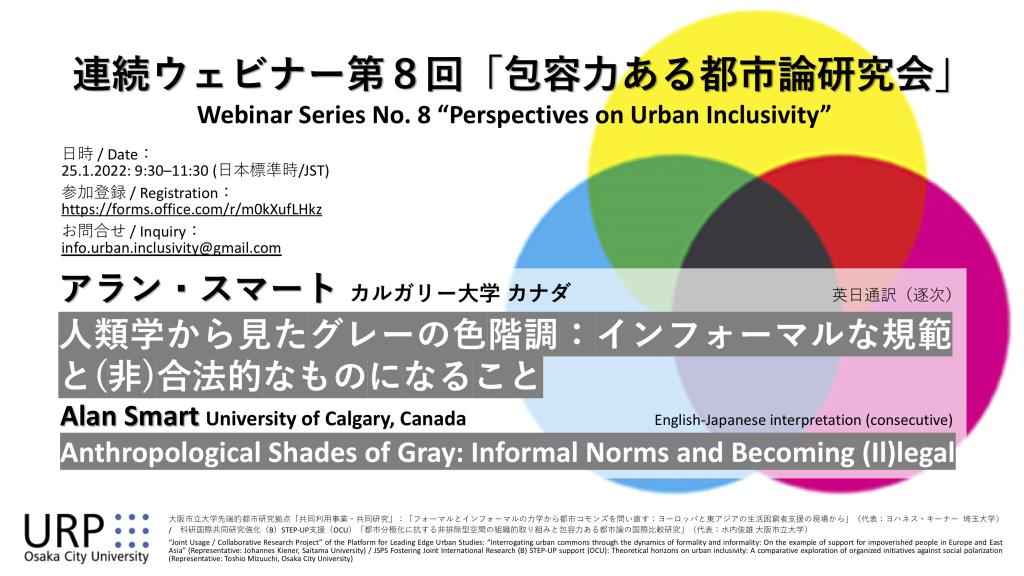2022年04月07日 / Update stopped.
Please visit our new website: Urban Research Plaza of Osaka City University has transformed into Urban Resilience Research Center, Osaka Metropolitan University.
2022年03月28日 / CCS Volume 28 is published.
see more details on the journal and a list of back issues.
2022年03月09日 / The 19th Urban Research Plaza’s Forum in Bangkok
“Voices of Researchers & Practitioners in Urban Culture”
Teleconference instructions, Program and Proceedings can be found at urpbkk.com.By the Faculty of Fine and Applied Arts Chulalongkorn University, Thailand and the Urban Research Plaza, Osaka City University, Japan
March 10-11, 2022 9:00 AM – 5:00 PM
Hosted by Chulalongkorn University
2022年01月20日 / Urban Research Plaza, Osaka City University Activity Summarization Symposium
Urban Research Plaza will be combined with Center of Education and Research for Disaster Management and integrated into “Urban Resilience Research Center”, due to merger of Osaka City University with Osaka Prefectural University at the beginning of the next fiscal year, April 2022. In this connection, we would like to hold a symposium with the aim of concluding the whole activity of the organization under the name of “URP” and clarifying what would be the legacies to pass on to the succeeding organization.
Among those, what should be listed with priority are the launch of an academic journal, City, Culture and Society, the formation of “East Asia Inclusive City Network”, and the advocacy of Inclusive Creative City Theory ahead of the times. We must at first express our gratitude to many colleagues for their tremendous contributions to those legacies, and also demonstrate how we are going to materialize the model of resilient cities applicable in the 21st century, which URP has been pursuing from the first.
The guest speakers will be the most important contributors to the abovementioned legacies and the colleagues who have been producing remarkable research results in relation to social inclusion or development in East Asian cities. In addition, the former dean of URP and two professors who will retire at the end of this fiscal year will also give memorial lectures. In conclusion, the present URP members will try to share a vision for the new organization.
Date: Feb. 12, 2022 (Sat.) 10:00~17:30 (JST) over ZOOM
Simultaneous interpretation into Japanese and English available
* To apply for the symposium, please scan the QR code on the right or visit this link.

2022年01月12日 / Webinar #9 Perspectives on Urban Inclusivity: Formalizing informality in colonial Hong Kong: Squatting, displacement and gentrification
Alan Smart (University of Calgary, Canada)
Date: 17. Feb. 2022 (Tue.) 9.30–11.30 (Japan Standard Time)
2022年01月12日 / Webinar #8 Perspectives on Urban Inclusivity: Anthropological Shades of Gray: Informal Norms and Becoming (Il)legal
Alan Smart (University of Calgary, Canada)
Date: 25. Jan. 2022 (Tue.) 9.30–11.30 (Japan Standard Time)
2021年12月22日 / Webinar #7 Perspectives on Urban Inclusivity: Poverty, Problematization and Socio-Spatial Management of Life on the Margins
Joshua Evans (Associate Professor of Human Geography, University of Alberta, Canada)
Date: 11. Jan. 2022 (Tue.) 9.30–11.30 (Japan Standard Time)
*If you would like to attend, please register at the following URL. The procedure is very simple!
https://forms.office.com/r/YM1FqSdTjY
A ZOOM address will be sent to registered participants shortly before the webinar.
Summary
Canada is a highly developed, wealthy country but its cities display some of the most egregious forms of inequality, precarity and injustice. The city of Edmonton is no exception. Located in Alberta, Edmonton is a city of roughly 1-million people. A few hours by car from the Athabasca oil sands, Edmonton’s economy has long been tied to the development of Alberta’s fossil fuel industry, yielding remarkable economic growth, high incomes, and ‘progressive’ social policy. Alberta was among the first provinces to implement the Housing First model as part of its provincial strategy to end homelessness, and the province invested hundreds of millions of dollars towards this goal. Yet Alberta’s prosperity and ambition belies the province’s threadbare social safety net, the main source of support for the economically marginalized. Here, welfare benefits are paltry and the wait time for subsidized housing is years long. On any given night, an estimated 3,000 houseless individuals find temporary accommodation in emergency shelters or makeshift, outdoor encampments on public lands scattered throughout the city. Emergency shelters offer only the bare essentials and often turn away individuals who are visibly intoxicated. Encampments offer freedom from the surveillance of shelter staff; however, they are routinely ‘cleared’ by police and city workers displacing individuals deeper into the densely forested river valley that runs through the city. It is no exaggeration to say that this form of precarity is a life-or-death concern, particularly in the winter months. Edmonton spends 180 days a year with temperatures below freezing, including 25 days with a minimum temperature below −20 °C.
Amputations due to frostbite are common and deaths due to exposure are a regular occurrence.
The grim situation outlined above is indicative of a regime of practices geographers have come to call “urban poverty management.” Urban poverty management is achieved through a mixture of caring and controlling institutions operated at the local level by urban elites, voluntary sector organizations and the state to ‘regulate’ urban poverty and, more generally, maintain social order in the city. This presentation introduces concepts for exploring urban poverty management; namely, Michel Foucault’s notions of the apparatus and problematization. Using Edmonton as a case study, the presentation will show how attending to problematization is key. The poverty management apparatus comes into view, for the analyst, through its problematization. In addition, the presentation will introduce the notion of the ‘thought-event,’ a conceptual device developed to focus attention on the spatiality of problematization. Using these concepts, the presentation will draw attention to the importance of the local state as a site of articulation and its role in reconciling conflict.
*The webinar will be conducted in English with Japanese consecutive interpretation. For the presentation we have planned 45 minutes allowing us to provide also about 15 minutes for discussion. Since we use consecutive interpretation, we anticipate that the presentation and discussion will take roughly twice the time.
**This webinar series is part of a research platform on issues such as homelessness, housing first, gentrification, citizenship and social innovations, focusing on case studies from Europe, North America and East Asia. The webinar will be facilitated by Johannes Kiener from Saitama University.
**If you have any questions, please contact us at the following address:
info.urban.inclusivity@gmail.com (webinar headquarters)

2021年11月25日 / CCS Volume 27 is published.
see more details on the journal and a list of back issues.
2021年11月01日 / CCS Volume 26 is published.
Recent developments in urban heritage valuation: Concepts, methods and policy application;
Edited by Patrizia Riganti, David Throsby
see more details on the journal and a list of back issues.
2021年08月10日 / CCS Volume 25 is published.
see more details on the journal and a list of back issues.

